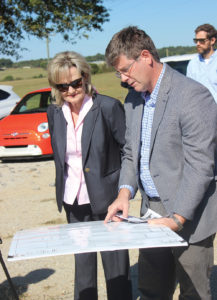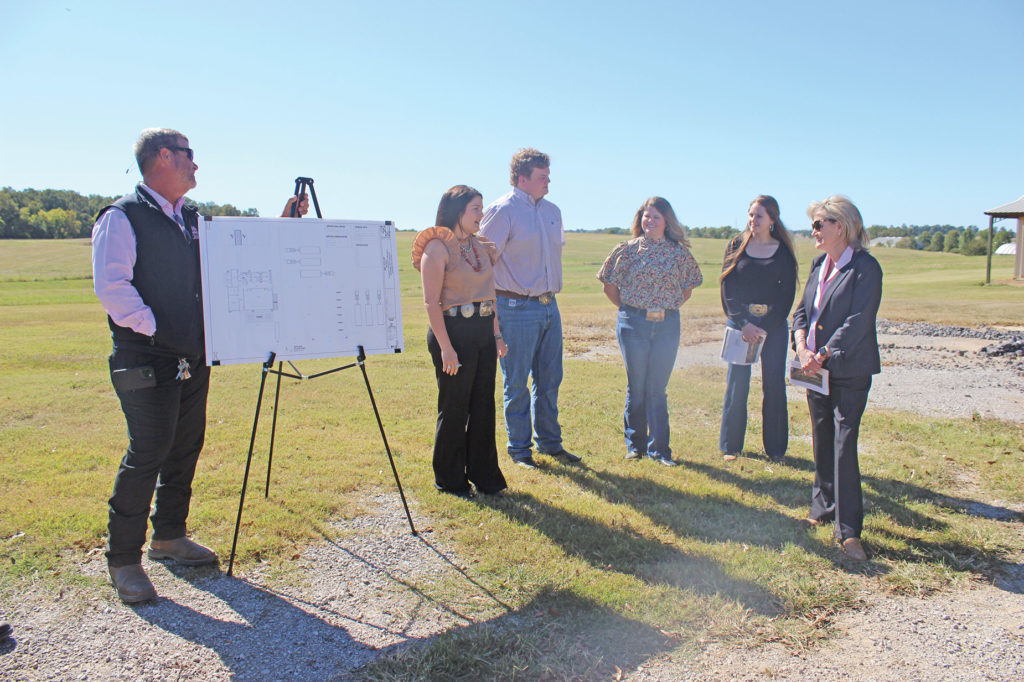
STARKVILLE — With curious cows looking on from their enclosures, U.S. Sen. Cindy Hyde-Smith (R-Mississippi) began her tour of the research facilities at the Mississippi State University College of Veterinary Medicine.
In Washington, D.C., Hyde-Smith sits on the Senate Committee on Agriculture and serves as a ranking member of the Livestock, Dairy, Poultry, Local Food Systems, and Food Safety and Security subcommittee.
The senator visited MSU on Monday to learn about the research and development in agriculture and the impact it will have statewide and globally. From messenger-RNA research, which will help save cattlemen millions each year, to new livestock judging facilities, Hyde-Smith got a rundown of some work being done to make sure the industry does not fall behind.
With the sun shining down in a pasture at South Farm off of Hail State Boulevard., the senator saw the plans for a livestock judging facility that will serve as the home for competitions for everything east of the Mississippi River, MSU livestock judging team coach Alex Pittman said.

Hyde-Smith said livestock judging is incredibly important to the industry and Mississippi is due a good and versatile facility.
“The facility is going to be used for many different things, but (livestock judging) is one of the purposes out there,” Hyde-Smith told The Dispatch. “You need the experts out in the field that can identify great genes in cattle so we can have a premium product. … Many, many years ago, the Southeast just did not have that premium product, but we’ve totally turned that around. We’re wanting to educate these young college students on what great quality cattle look like so that we can improve our herds, and this is one way to do it.”
The new facility was originally set to cost $850,000, but because of the high cost of materials, the final cost is estimated to be between $1.2 million and $1.3 million.
The facility is in the process of environmental review which Cory Gallo, interim assistant dean of the College of Landscape Architecture, said typically takes the longest. After the review is done, construction should begin around May or June 2023.
Feeding the world
In a panel hosted by Farm Journal Foundation at MSU, Hyde-Smith joined Keith Coble, vice president of the Division of Agriculture, Forestry, and Veterinary Medicine at MSU; Mike McCormick, president of Mississippi Farm Bureau; Margaret Khaitsa, professor of veterinary epidemiology at the CVM; and Mark Leggett, president of the Mississippi Poultry Association for a discussion on agricultural research and development in addressing world hunger.
Hyde-Smith said it is important to capitalize on the successes that not only help U.S. farmers, but the science will help those in developing countries learn proper practices for their own product.
Coble said research done at MSU helped the soybean product in Mississippi, which about 25 years ago wasn’t yielding the results for a sustainable product.
“Our job is to do research that is relevant,” Coble said. “Our job is also to make sure that people that can use that research know about it, and that’s why communicating out to the people who can use it is so fundamentally important. … I moved here in 1997, and the way we grew soybeans in this state was low-yielding and risky. Through the work of our people here at the university and others around this state, I see soybean yields double what they were 25 years ago, and it’s much less risky. This puts our soybean farmers in a better position to compete against the midwest and against Brazil.”
Khaitsa said MSU’s work will help farmers in developing countries such as Ghana and her native Uganda. To ensure those in the developing countries do receive the research and the methods, funding is important.
Each panelist, in their own way, discussed how funding is necessary to keep operations running and improving. Hyde-Smith said it is important to continue funding research regarding diseases that impact livestock even when they aren’t prevalent.
“We have to make sure those programs are funded to respond because you have to respond so quickly,” Hyde-Smith said. “If you’re caught flat-footed, that’s just a bigger hill to have to climb. The markets are so important that you need to be prepared for any alternative issue that shows up that we are not expecting. You better be expecting it. … You better have those funds available to be able to address it.”
For making substantial change in the industry, McCormick offered advice to farmers and others invested in agricultural growth to learn public officials.
“Be aware of who your elected officials are and how they impact your life and the research that we need in agriculture,” McCormick said.
“You’ve got to have a voice. Getting to know individuals, getting to know your community leaders, your county supervisors, the people in Extension Service and letting them know how important research is for our farmers and how that fuels their local economies is just extremely important.”
You can help your community
Quality, in-depth journalism is essential to a healthy community. The Dispatch brings you the most complete reporting and insightful commentary in the Golden Triangle, but we need your help to continue our efforts. In the past week, our reporters have posted 42 articles to cdispatch.com. Please consider subscribing to our website for only $2.30 per week to help support local journalism and our community.







